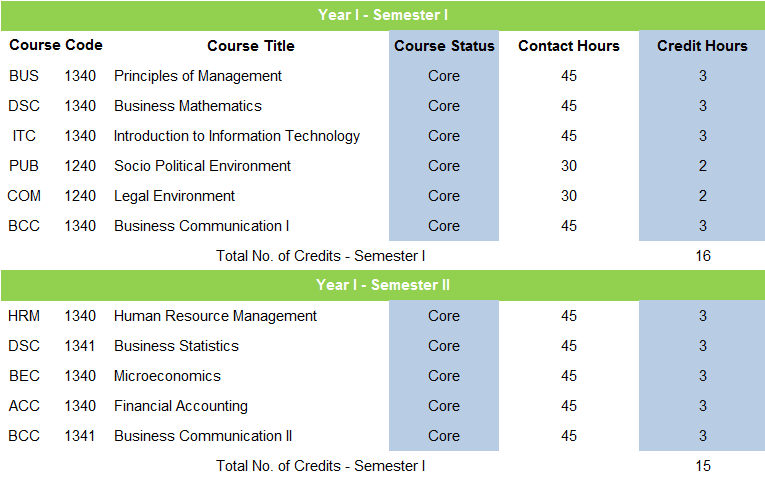Programme Structure
All undergraduates enrolled in the Faculty of Management Studies and Commerce, except for some exceptions in the case of the B.Com (Special), B.Sc. Estate Management and Valuation (Special) and B.Sc. Management (Public) (Special) degree programs are required to follow a common curriculum in management during Year I, before they are selected to the departments. This is intended to provide the core business knowledge by teaching basic concepts in all functional areas in business.
Undergraduates who are selected to the Department of Business Economics (from Year II onwards) also have followed this Management Common Programme.
The structure of the common program is depicted in Table 1.
Table 1: B.Sc. Business Administration (Business Economics) (Special) Degree Programme Structure of Years I
Programme Structure
At the beginning of the second semester of Year III the students following this degree programme are required to select one specialization area out of the following two options.
1. Development Studies (DS)
This is an interdisciplinary study area which trains the students to understand the complex processes of economic development and to solve development problems. It deals with theoretical, empirical, as well as practical dimensions of economic development. The students who specialize in this area will be equipped with the skills of policy studies, policy making, analysis and evaluation. Additionally, this study programme offers many options at the postgraduate level for the students who are willing to engage in advanced studies. The employment opportunities are also numerous at many local and international institutions such as the Central Bank of Sri Lanka, World Bank, International Monetary Fund, Asian Development Bank and United Nations etc.
2. Banking (BNK)
This study area encompasses a range of disciplines in bank management, central banking, monetary policy analysis and financial system analysis etc. At the end of this study programme students should be able to gain the expertise to manage a firm mitigating the risks in the financial system. The specialized nature of this area makes the students able to hold the top level management positions at institutions specially in the banking and finance sector such as the Central Bank of Sri Lanka, Security and Exchange Commission, commercial banks and other financial institutions.
Depending on the selection of the specialization area, the core subjects of certain semesters would be different.
The structure for Years II to IV of B.Sc. Business Administration (Business Economics) (Special) degree programme is given in Table 2.
Table 2: B.Sc. Business Administration (Business Economics) (Special) Degree Programme Structure for Years II, III and IV
